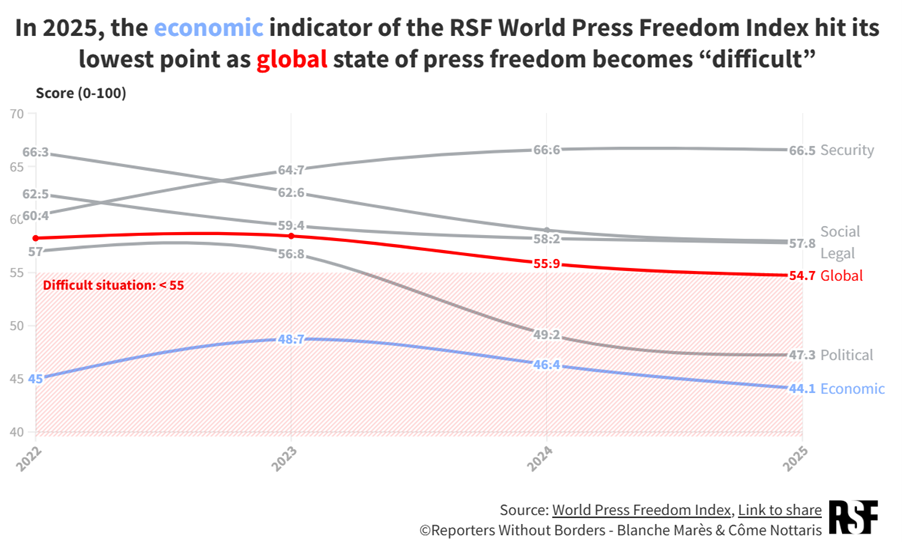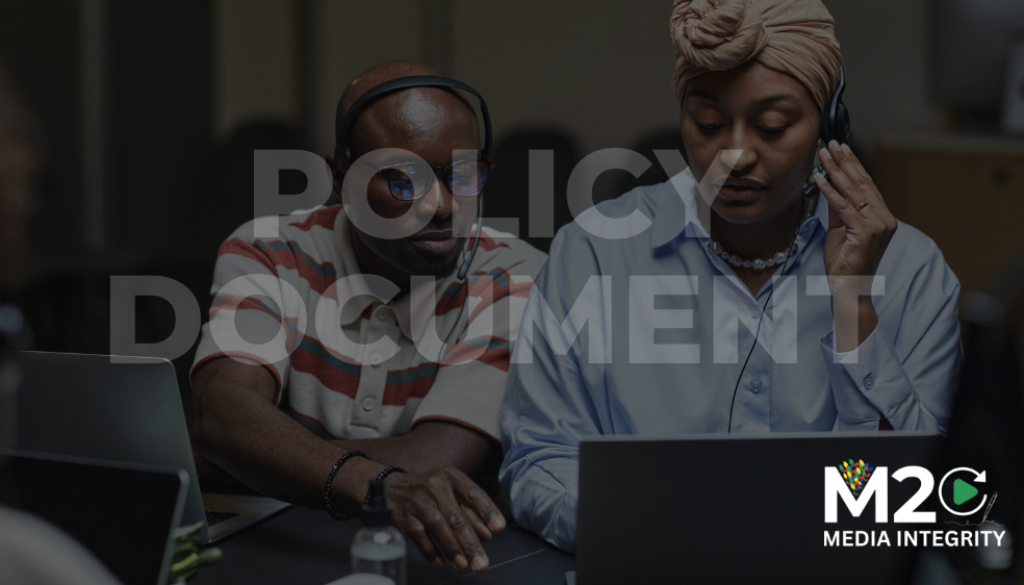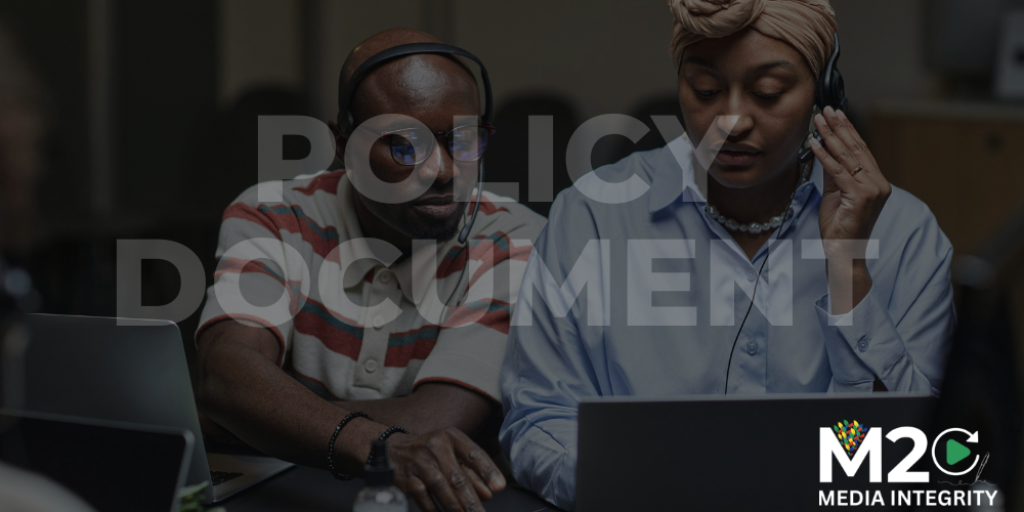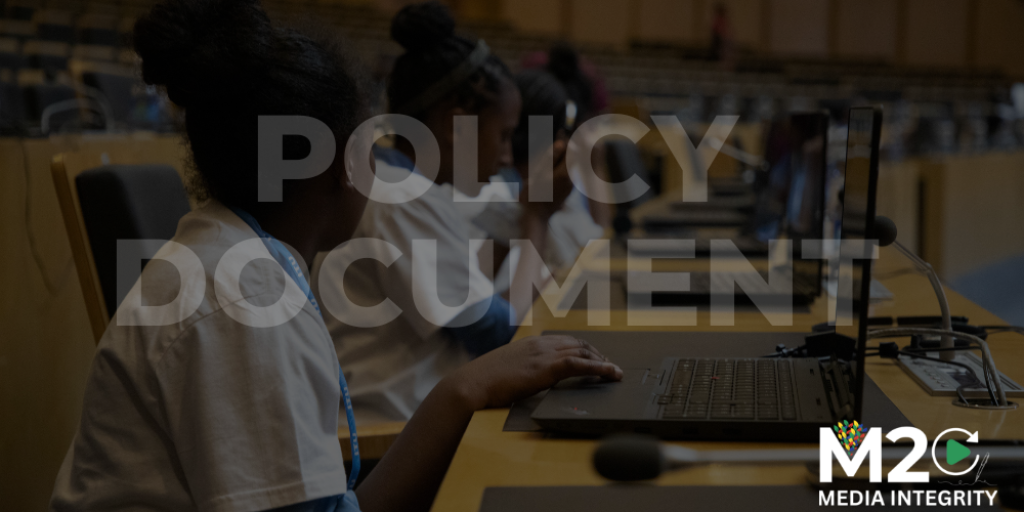M20 Policy Brief 8: The vanishing lifeline — Policy solutions for media funding challenges
Download the PDF here.
Lead writers Pierre Dagard and Sadibou Marong, RSF/Reporters Without Borders
Overview
Press freedom is a cornerstone of democracy, but it faces growing challenges in G20 countries and beyond – not only from censorship and political interference but also from media financial instability. The 2025 World Press Freedom Index revealed the dire state of the news economy and its severe effect on editorial independence and media pluralism. According to RSF’s survey, media outlets in 160 out of 180 countries reported achieving financial stability ‘with difficulty’ or ‘not at all’.

Above all, the 2025 RSF’s Index reveals that, while not the most visible challenge facing press freedom globally, media sustainability has, over time, become a significant threat to the very survival of journalism in some parts of the world.

UNESCO’s 2021/22 World Trends in Freedom of Expression and Media Development Global report described media funding as an “existential funding crisis” that COVID‑19 exacerbated, warning of an “extinction event” for journalism.
Proposal to the G20
A shortage of adequate resources undermines journalistic independence, fosters editorial bias, and creates vulnerability to the capture of media houses by business and political interests, limiting the public’s access to reliable information. To safeguard press freedom and the right to be informed by a plurality of trustworthy sources of information, governments, civil society and media organisations must rethink how journalism is funded and sustained. This can be achieved through a combination of financial and regulatory support.
The G20 should consider the need for a coordinated response to protect press freedom globally. G20 leaders must recognise that:
- Free, independent and reliable journalism is essential for society and the economy to function transparently. It supports anti-corruption efforts, informed policy-making and citizen engagement;
- No crisis or challenge identified as G20 priorities – whether health, climate, economic, political, or humanitarian – can be addressed without fact-based, independent information at its core. Quality information cannot be produced without journalists getting paid and media outlets generating sufficient resources.
Defining the issues and why it is important in a G20 context
Media funding involves several factors and a variety of resources. On the one hand, there are traditional economic resources based on advertising and subscriptions; on the other hand, public or philanthropic financing. Each of these funding sources faces specific challenges that affect media viability, which is defined in the Media Viability Manifesto as ‘an operational state at the business level where media organisations demonstrate their ability to produce independent journalism that serves the public good whilst also implementing feasible business operations and staying financially afloat’ – see M20 Policy Brief ‘Fuelling democracy and growth through viable media’.
While the concept of media viability requires comprehending the broader economic environment in which media outlets operate, this paper focuses on some of the specific challenges affecting various media revenue streams, such as:
1. Concentration of advertising revenues for digital platforms
Tech platforms use media content to attract users and sell ads, but don’t share the resulting revenues on a fair basis. Digital giants take up to 80% of online ad revenue, leaving legacy and independent outlets with shrinking income streams. In many regions of the world, media outlets are losing billions following the digital giants’ takeover of online advertising revenues. The capture of advertising revenue by digital giants reinforces their dominance and diverts the financial resources needed for journalism. This puts the media’s dependence on precarious models.
2. Platform dominance and market power
The UN Global Principles for Information Integrity recognise that the current business models of dominant platforms — which are built on the attention economy — have led to a prioritisation of content designed to polarise and produce strong emotions in a bid to maximise users’ engagement and related revenue. This has been to the detriment of quality, informative, trustworthy content on social media, making it harder for them to reach audiences organically.
Furthermore, several reports have estimated that 80% of the media’s organic online traffic comes from the services of two companies (Google and Meta) – and this flow is declining drastically due to the rise of generative AI services, which send much less traffic on to the websites from whence they scrape their content.
3. Market concentration and political, or oligarchic, capture of media
The RSF 2025 World Press Freedom Index has shown that media markets are highly concentrated in a great number of countries. In 46 of them, a majority of respondents say that the media market is highly concentrated, or entirely controlled by the State. In countries like Turkmenistan, Eritrea and Vietnam (which stand at the bottom of the 2025 ranking), where only State-owned media outlets are allowed, political control undermines editorial independence, leading to censorship, propaganda, and erosion of public trust.
Furthermore, media ownership concentration reduces media plurality and often sidelines smaller, local, and non-profit media organisations. This is the result of the concentration of the main media outlets in the hands of a small number of owners who use them as tools for political and economic influence. In many countries, this oligarchic capture has increased, especially as financially struggling outlets accept ownership or funding from vested interests. Combined with a lack of transparency regarding ownership and funding, it hinders new players from entering the market.

4. Unfair allocation of public subsidies and State advertising
The opaque and discriminatory allocation of public funding is another aggravating factor. In several countries, state advertising or media subsidies are used as a lever to favour pro-government media and punish critical media. The unequal distribution of the advertising money favours control or manipulation by actors close to the government and economically stifles independent media. Media that are critical of government policies also face the threat of defunding, sometimes under pretexts like misinformation or national security.
5. Shrinking public funding for media
The succession of economic crises is forcing governments to cut spending, thereby weakening financial support for the media. This is compounded by political decisions that have collateral effects on media funding around the world, such as the current suspension of US development aid. The Trump administration’s decision to freeze billions of dollars in global aid projects, including over US$268 million allocated by Congress to support independent media and the free flow of information, has plunged many NGOs, media outlets, and journalists into chaotic uncertainty. Public broadcasters globally – like the media overseen by the US Agency for Global Media – also face budget cuts and political interference, leading to layoffs, closures and reduced coverage.
Proposals for G20 consideration
While strictly respecting press freedom, independence and pluralism, including journalistic universally-recognised self-regulatory professional ethics, G20 leaders should commit to:
1. Recognise and protect the added value of trusted, independent journalism for sustainable development and society at large
- Ensure, protect and promote a free, viable, independent and pluralistic media environment, taking robust measures to safeguard journalists, media workers and fact-checkers.
- Include media funding in G20 communiqués and agenda of working groups.
- Recognise that press freedom and the right to reliable information are crucial to inform investment strategies of public development banks, and are a prerequisite for sustainable development.
- Embed journalism and media funding issues in broader G20 discussions on democracy, digital regulation and sustainable development, or create a dedicated G20 Media Engagement Group.
2. Prioritise public funding to media that commit to upholding high editorial standards and practices
- Spend at least 0,1% of GDP on direct domestic support for independent and trusted media outlets, as recommended by the Forum on Information & Democracy’s report New Deal for Journalism.
- Incentivise (through higher direct funding support, or forms of indirect support such as tax breaks) media outlets to adhere to globally recognised norms and practices of professional and ethical journalism, emphasising impartiality and independence.
- Provide funding to self-regulatory systems whose purpose is to promote high standards and practices of professional and ethical journalism, such as the Journalism Trust Initiative (over 2000 media in 119 countries worldwide).
- Ensure transparency and political neutrality in the allocation of public subsidies or State advertising.
3. Develop policies and platform regulations to enable independent and trusted journalism to thrive in digital markets
- Ensure fair revenue-sharing between platforms and media outlets through the enforcement of applicable competition and/or copyright legislation.
- Require large digital platforms to ensure the due prominence of trusted sources of information – identified as such based on robust, independent self-regulatory systems – on their services.
- Require large digital platforms and other online intermediaries involved in programmatic advertising to adopt globally recognised norms and practices of professional and ethical journalism, such as proposed by the Journalism Trust Initiative, to enable their advertising clients to allocate spending to independent, public interest journalism.
- In addition to the compensation frameworks mentioned above, implement a digital tax on platforms with part of its revenue earmarked towards the news sector – watch out for the forthcoming M20 Summit session of the Forum on Information & Democracy on digital taxes to fund quality journalism.
G20 members are encouraged to also take inspiration from the South African Competition Commission’s Media and Digital Platforms Market Inquiry (February 2025 provisional report)
4. Create incentives for advertisers to uphold democratic values and to fund journalism
- Introduce the principle that private companies, and primarily advertising companies, have a ‘democratic responsibility’, on top of their corporate social responsibility. That responsibility should lead advertisers to align their advertising spending with the funding of public interest journalism, integrating reliability and journalistic ethics as key requirements in the placement of advertising.
- Encourage advertisers to harness existing media industry standards that support professional and ethical journalism and help to ensure brand safety.
- Require ad tech companies to establish and publish principles relating to human rights that a website, social media account or channel must adhere to before they can monetize advertising.
5. Use ODA funds to resist the emergence of news deserts
- Recognise that Official Development Assistance (ODA) must incorporate support for independent journalism in fragile States as an indispensable asset for economic development and the strengthening of democratic governance.
- Allocate a minimum of 1% of ODA, with full transparency, to offer training and capacity building in digital, information and media literacy programmes in weakened information ecosystems.
- Cooperate with developing countries in nationally led efforts to build a stronger and safer environment for the exercise of independent journalism.
Proposed text for inclusion in G20 outputs
For the Heads of State (“Leaders’ declaration”)
“We recognise the role that journalists and media play as providers of accurate, reliable and independent information, which is essential for the exercise of fundamental rights and freedoms.”
“We note the collapse in business models that support public interest journalism and are aware of the crisis of sustainability for the news media industry as being one of the main causes for the decline of press freedom globally.”
“We agree to commit to supporting efforts that sustain conditions to ensure the financial viability of journalism while ensuring that this support empowers and does not undermine editorial independence and journalistic freedom.”
For the Digital Ministers 2025 declaration
“In the face of growing threats from mis- and disinformation, we highlight the vital role that independent and financially viable media play in providing trustworthy public-interest information. Strengthening media viability is essential to ensuring information integrity, including in the digital space.”
“We encourage digital platforms and technology companies to recognise the value of self-assessment and independent certification systems, such as the Journalism Trust Initiative, as an indicator of quality journalism and public interest information and potential partners in confronting disinformation.”
“Where commercial interests would normally drive curation by online intermediaries, we acknowledge that a ‘due prominence’ obligation is necessary to enhance the findability and visibility of public interest content that is produced with accountability and in line with professional and ethical norms.”
Acknowledgements and call for comments
This policy brief was commissioned within the framework of the M20 ahead of the G20 Summit.
The M20 initiative is a “shadow” parallel process set up to intersect with the G20 processes. The M20 seeks to persuade the G20 network of the most powerful global economies to recognise the news media’s relevance to their concerns.
As a collaborative M20 document, this paper is a working, live document. Share your suggestions or comments for consideration: [email protected].
For more information about the G20 process, which is hosted by South Africa in 2025, visit the website here
Source documents and further reading
- Reporters Without Borders (RSF), 2025 World Press Freedom Index
- Forum on Information and Democracy, 2021 A New Deal for Journalism
- Media Freedom Coalition, 2024, Why Media Freedom Matters
- Media Viability Manifesto Initiative, 2025, The Media Viability Manifesto
- United Nations Global Principles for Information Integrity
- UNESCO, 2022, 2021/22 World Trends in Freedom of Expression and Media Development Global report
This policy brief can be republished under Creative Commons licence, – i.e. provided that you credit the source, indicate any changes to the text, and link back to the original article on the M20 site.



